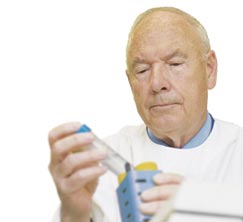Carden Fellow 1954 — 2014
 Professor Metcalf’s painstaking and dedicated research over six decades contributed significantly to how we understand and treat cancer.
Professor Metcalf’s painstaking and dedicated research over six decades contributed significantly to how we understand and treat cancer.
Since becoming Cancer Council Victoria’s Carden Fellow in 1954, Professor Metcalf spent most of his time discovering, isolating and producing agents called Colony Stimulating Factors (CSFs), which are the naturally occurring regulators of bone marrow growth.
Professor Metcalf was able to see his work in the lab translate into treatments for cancer patients. Licensed for general use in 1990, an estimated 20 million patients worldwide have received CSFs as part of their cancer treatment.
One of the first patients in the world to receive CSF treatment was renowned tenor José Carreras. After developing acute myeloid leukaemia, which didn't respond to initial treatment, Mr Carreras received CSF therapy in 1987. He recovered and was able to personally thank Professor Metcalf in 1991 at the Carden Cancer Research Laboratory in Melbourne.
Professor Metcalf continued to be at the forefront of his field, investigating stem cells, receptors for CSFs, issues of cell survival and suppressors of cell signaling; and being involved in the discovery of another mysterious multiple-action growth factor, the leukaemia inhibitory factor.
While he officially “retired” in 1996, Professor Metcalf continued to dedicate his life to cancer research and celebrated 60 years as a Carden Fellow upon his retirement in December 2014.
Cancer Council Victoria’s Venture Grants Scheme was renamed Metcalf Venture Grants in 2014 to honour Professor Metcalf’s years of commitment to cancer research.
Professor Metcalf has received some of the highest honours in the world of contemporary science, including:
1976: Officer of the Order of Australia (AO)
Gold Medal of the Australian Cancer Society
1986: Appointed Professor of Cancer Biology at the University of Melbourne
Honoured with the Wellcome medal by the Royal Society of England
1987: Bristol-Myers Award for Distinguished Achievement in Cancer Research
1988: Robert Koch Prize recipient in recognition of outstanding fundamental research in Immunology; Appointed
Foreign Associate of the US National Academy of Sciences
1993: Albert Lasker Award for Clinical Medical Research
Companion of the Order of Australia
2001: Prime Minister’s Prize for Science
2007: American Association of Cancer Research Lifetime Achievement Award
